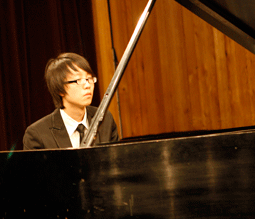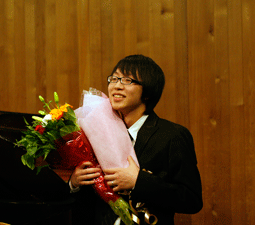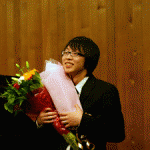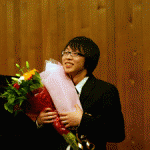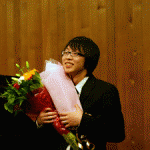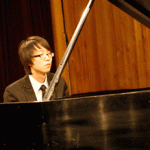As much as Kathryn’s jazz recital (on May 10) was roudy, Rich’s recital that same evening was subdued. Coming from Taiwan, China, it was not in Rich’s nature to be a showman or to stand out.
Not surprisingly, Rich’s six-song line-up included songs from the classical masters, Hayden, Bach, Chopin, as well as surprises from Bartok and Bolcom.
His first choice, “Sonata in E Major,” by Joseph Hayden was an upbeat, lively piece. It reminded me of the kind of music that one hears when the bridesmaids are walking down the aisle before a wedding.
His next song, “Romanian Folk Dances,” by the Hungarian composer, Bela Bartok, was a surprise. The six separate, short songs were both moody, moving and danceable. Their titles included: Stick Game, Peasant Costume, Standing Still, Song of the Mountain Horn, a Garden Gate in Romania and Little One.
According to various web sites, Bartok had a lifetime fascination with folk songs. It may have started with the changing borders of the neighboring countries. Bartók grew up in the Greater Hungary of the Austro-Hungarian Empire which was partitioned after World War I. His birthplace, Nagyszentmiklós (Great St Nicholas), became Sînnicolau Mare, Romania.
A recording of various musicians playing these Bartok folk songs can be found on You Tube.
“I gave him those songs,” said Nelms McKalvin, his teacher. “We like to mix it up a bit.”
His girlfriend, Stephanie, especially liked them. She kept nudging her friends in the audience, and beaming. Stephanie’s former violin teacher in Korea was from Russia. And her recital earlier this year had similar songs from Eastern Europe (see post, “Fast Fingers at Junior Recitals,” from Feb. 23, 2010).
The next two songs by Frederic Chopin, “Mazurka Op. 6, No. 2” and “Waltz Op. 69, No. 2” were lively, interesting and sounded like they were being played on a harpsicord rather than a piano. The “Walz Op. 69, No. 2” was created after Chopin’s death.
For his final number, “Through Eden’s Gates,” by William Bolcom, was the one we were all waiting for: a duet with two grand pianos.
At intermission, Doug Ashcraft, head of the Music Department, and McKelvain moved in another grand piano, so they were side-by-side.
“It would have been better if they put the pianos end to end,” said Ieseul later. “The sound would have been better, but they couldn’t do it.”
“Through Eden’s Gates” was arranged for two pianos by Bolcom, an American who is best known for cabaret songs, concertos, sonatas, operas and symphonies. It is part of a Garden of Eden Suite that includes The Eternal Feminine, The Serpent’s Kiss, and Old Adam.
At PianoFest earlier this year, seniors Ieseul and Daphne gave an impressive performance of Bolcom’s “The Eternal Feminine,” while Georgina and Jonathon gave their Yamaha’s a workout with “The Serpent’s Kiss.” (See “PianoFest” posting from January 22, 2010)
Most of the piano majors were sitting close to the piano, so they could watch their hands. But from across the room, it was difficult to tell who was playing what. Yet, “Through Eden’s Gates,” was a thorny, lively and wonderful duet by two friends.
After Ieseul and Rich took their bows, Stephanie and Rich’s sister, Una, gave him bouquets of flowers.
“We couldn’t be more proud of him,” said McKalvain afterwards to Rich’s parents who now live in Idyllwild.
“Now go home and celebrate,” McKalvain said to Rich, who was beaming. “I don’t want to see you here practicing tomorrow.”
the attachments to this post:
